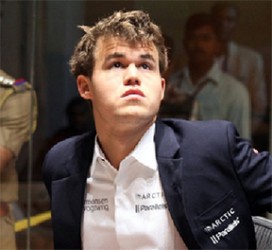Last year, world champion Viswanathan Anand lost game seven of his world championship match to his challenger Boris Gelfand, an Israeli grandmaster, in a best-of-12 series. However, he rebounded to capture game eight in 17 moves, the shortest win in world championship history.
Anand was down 4-3 but his defeat of Gelfand in the eighth, brought the troubled ship back on an even keel. Anand went on to win the match and retain his title. Now with his new challenger, Norway’s Magnus Carlsen, Anand’s home country and Indians scattered throughout the universe, were urging him on to re-perform the Gelfand trick. But the problem is that Carlsen is an elegantly superior player to Gelfand and becomes dangerous as his opponent attempts to steal a game from him. Carlsen leads the world champion by a 6-3 margin, nine games having been completed from the 12-game series. Carlsen only needs another half point to clinch the title or a draw in the next three games. So although the match is not technically over, it is in a sense, over. Anand’s task seems insurmountable. Which brings us to the ever persistent and intriguing question: Is the match too short? Well, before the match began, I cannot recall listening to any complaints about the irregular nature of the match neither from the Indian side nor the Norwegian side. I assume everyone was satisfied.
Carlsen has been the number one player in the world almost continuously since January 2010. Only the world championship title eluded him. He qualified to play Anand following his victory in the Candidates final in March of this year in London. The match began with two tame draws, with each player testing the waters of his opponent. Two exciting draws followed and both Carlsen and Anand excelled at different times in the third and fourth games. Then came game five, and with that came the shift in Carlsen’s favour. The game lasted 58 moves and a little more than five-and-a-half hours. Anand, though playing fighting chess and determined throughout the game, resigned. Those who favoured Anand, and locally there are more than a sprinkling of fans, immediately took heart in the fact that Anand had the white pieces for game six. White moves first and places Black at a mild disadvantage. After 20 moves, the chances were equal. Then Anand made a small error and gave Carlsen the tiniest of advantages. It was all that Carlsen needed. With computerlike precision, Carlsen created problem after problem and began squeezing and squeezing his prey much like a boa constrictor.
 Finally, Anand erred, moving a rook when he should have pushed a pawn and Carlsen struck! The Norwegian wunderkind began a pawn march towards the queening square and the world champion resigned in 67 moves for the second time in two successive games. The New York Times has noted that perhaps Anand is afraid of Carlsen, based on a comment made by Vladimir Kramnik, Anand’s predecessor. In an interview that Kramnik gave to the Pune Mirror, an English language newspaper from India. The Times quoted Kramnik as saying: “The only problem I think Anand is facing is that he ‒ this is just my opinion ‒ is somewhat intimidated by Carlsen. He is playing unconfidently against him. He’s scared of him, I would say.’’
Finally, Anand erred, moving a rook when he should have pushed a pawn and Carlsen struck! The Norwegian wunderkind began a pawn march towards the queening square and the world champion resigned in 67 moves for the second time in two successive games. The New York Times has noted that perhaps Anand is afraid of Carlsen, based on a comment made by Vladimir Kramnik, Anand’s predecessor. In an interview that Kramnik gave to the Pune Mirror, an English language newspaper from India. The Times quoted Kramnik as saying: “The only problem I think Anand is facing is that he ‒ this is just my opinion ‒ is somewhat intimidated by Carlsen. He is playing unconfidently against him. He’s scared of him, I would say.’’
I doubt whether this criticism of Anand is accurate, because Anand is facing his most worthy challenger since he became world champion. Carlsen consistently demonstrates an incredible memory and ability to make decisions at lightning speed. Anand did not go outrageously wrong in any given variation, yet he lost three vital games. Carlsen’s incessant probing causes his opponents to make mistakes.
And this is exactly what happened to Anand. Carlsen’s relentless pressuring of an equal position eventually put holes in the position, and bingo, before you know it, you are in serious trouble.

Fischer had sealed his move, and Spassky resigned immediately when he saw it. Someone alerted Fischer that Spassky had resigned without continuing. Fischer was not amused. He exclaimed, “Now what will I do for the rest of the day! And tomorrow happens to be a rest day!” But Anand is certainly not Robert James Fischer. The chess world is saying that the match is over as Carlsen only needs a half-point to win or a draw in the next three games. In the 12-game series, the first player to reach 6½ points, wins the match.
If Carlsen wins the match and becomes the world champion, we have to wait and see what he will do to make the game popular again. Although an estimated six hundred million people play chess according to YouGov, a research firm, and although chess has been added to the school curriculums in several countries, serious sponsorship is still lacking in Guyana and the rest of the world. Chess had basked in the spotlight at the time of the Fischer-Spassky match in 1972. When Fischer retired from the game, chess took a nosedive from which it has never recovered. The greatest celebrity to emerge after Fischer has been Garry Kasparov, but even his electrifying name has not checked the downward spiral of things.
But Carlsen is young, energetic and electric. Other than chess he models clothes for the company G-Star Raw and is considered a rock star among young people. Even in Anand’s country Carlsen attracted the presence of a few thousand girls when he visited the Chennai playing site a few months ago. Let us see how he directs the future of the game!
In local chess Anthony Drayton won the senior qualifiers chess tournament last weekend. Seven players qualified to face Taffin Khan with the intention of wresting his championship title away from him. The senior national chess championship begins next weekend at the Ocean Spray hotel.
Here are four games from the Anand-Carlsen World Championship match.
Event: Anand-Carlsen World
Championship
Site: Chennai, India
Date: 15.11.13
Round 5
Result: 1-0
White: Magnus Carlsen
Black: Viswanathan Anand
1.c4 e6 2.d4 d5 3.Nc3 c6 4.e4 dxe4 5.Nxe4 Bb4+ 6.Nc3 c5 7.a3 Ba5 8.Nf3 Nf6 9.Be3 Nc6 10.Qd3 cxd4 11.Nxd4 Ng4 12.O-O-O Nxe3 13.fxe3 Bc7 14.Nxc6 bxc6 15.Qxd8+ Bxd8 16.Be2 Ke7 17.Bf3 Bd7 18.Ne4 Bb6 19.c5 f5 20.cxb6 fxe4 21.b7 Rab8 22.Bxe4 Rxb7 23.Rhf1 Rb5 24.Rf4 g5 25.Rf3 h5 26.Rdf1 Be8 27.Bc2 Rc5 28.Rf6 h4 29.e4 a5 30.Kd2 Rb5 31.b3 Bh5 32.Kc3 Rc5+ 33.Kb2 Rd8 34.R1f2 Rd4 35.Rh6 Bd1 36.Bb1 Rb5 37.Kc3 c5 38.Rb2 e5 39.Rg6 a4 40.Rxg5 Rxb3+ 41.Rxb3 Bxb3 42.Rxe5+ Kd6 43.Rh5 Rd1 44.e5+ Kd5 45.Bh7 Rc1+ 46.Kb2 Rg1 47.Bg8+ Kc6 48.Rh6+ Kd7 49.Bxb3 axb3 50.Kxb3 Rxg2 51.Rxh4 Ke6 52.a4 Kxe5 53.a5 Kd6 54.Rh7 Kd5 55.a6 c4+ 56.Kc3 Ra2 57.a7 Kc5 58.h4 1-0
Date: 16.11.13
Round 6
Result: 0-1
White: Viswanathan Anand
Black: Magnus Carlsen
1.e4 e5 2.Nf3 Nc6 3.Bb5 Nf6 4.d3 Bc5 5.c3 O-O 6.O-O Re8 7.Re1a6 8.Ba4 b5 9.Bb3 d6 10.Bg5 Be6 11.Nbd2 h6 12.Bh4 Bxb3 13.axb3 Nb8 14.h3 Nbd7 15.Nh2 Qe7 16.Ndf1 Bb6 17.Ne3 Qe6 18.b4 a5 19.bxa5 Bxa5 20.Nhg4 Bb6 21.Bxf6 Nxf6 22.Nxf6+ Qxf6 23.Qg4 Bxe3 24.fxe3 Qe7 25.Rf1 c5 26.Kh2 c4 27.d4 Rxa1 28.Rxa1 Qb7 29.Rd1 Qc6 30.Qf5 exd4 31.Rxd4 Re5 32.Qf3 Qc7 33.Kh1 Qe7 34.Qg4 Kh7 35.Qf4 g6 36.Kh2 Kg7 37.Qf3 Re6 38.Qg3 Rxe4 39.Qxd6 Rxe3 40.Qxe7 Rxe7 41.Rd5 Rb7 42.Rd6 f6 43.h4 Kf7 44.h5 gxh5 45.Rd5 Kg6 46.Kg3 Rb6 47.Rc5 f5 48.Kh4 Re6 49.Rxb5 Re4+ 50.Kh3 Kg5 51.Rb8 h4 52.Rg8+ Kh5 53.Rf8 Rf4 54.Rc8 Rg4 55.Rf8 Rg3+ 56.Kh2 Kg5 57.Rg8+ Kf4 58.Rc8 Ke3 59.Rxc4 f4 60.Ra4 h3 61.gxh3 Rg6 62.c4 f3 63.Ra3+ Ke2 64.b4 f2 65.Ra2+ Kf3 66.Ra3+ Kf4 67.Ra8 Rg1 0-1
Date: 18.11.13
Round 7
Result: 1/2-1/2
White: Viswanathan Anand
Black: Magnus Carlsen
1.e4 e5 2.Nf3 Nc6 3.Bb5 Nf6 4.d3 Bc5 5.Bxc6 dxc6 6.Nbd2 Bg4 7.h3 Bh5 8.Nf1 Nd7 9.Ng3 Bxf3 10.Qxf3 g6 11.Be3 Qe7 12.O-O-O O-O-O 13.Ne2 Rhe8 14.Kb1 b6 15.h4 Kb7 16.h5 Bxe3 17.Qxe3 Nc5 18.hxg6 hxg6 19.g3 a5 20.Rh7 Rh8 21.Rdh1 Rxh7 22.Rxh7 Qf6 23.f4 Rh8 24.Rxh8 Qxh8 25.fxe5 Qxe5 26.Qf3 f5 27.exf5 gxf5 28.c3 Ne6 29.Kc2 Ng5 30.Qf2 Ne6 31.Qf3 Ng5 32.Qf2 Ne6 1/2-1/2
Date:19.11.13
Round 8
Result: 1/2-1/2
White: Magnus Carlsen
Black: Viswanathan Anand
1. e4 e5 2. Nf3 Nc6 3. Bb5 Nf6 4. O-O Nxe4 5. Re1 Nd6 6. Nxe5 Be7 7. Bf1 Nxe5 8. Rxe5 O-O 9. d4 Bf6 10. Re1 Re8 11. c3 Rxe1 12. Qxe1 Ne8 13. Bf4 d5 14. Bd3 g6 15. Nd2 Ng7 16. Qe2 c6 17. Re1 Bf5 18. Bxf5 Nxf5 19. Nf3 Ng7 20. Be5 Ne6 21. Bxf6Qxf6 22. Ne5 Re8 23. Ng4 Qd8 24. Qe5 Ng7 25. Qxe8+ Nxe8 26. Rxe8+ Qxe8 27. Nf6+ Kf8 28. Nxe8 Kxe8 29. f4 f5 30. Kf2 b5 31. b4 Kf7 32. h3 h6 33. h4 h5 1/2-1/2








